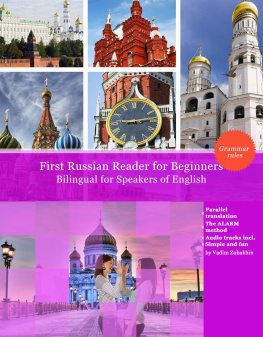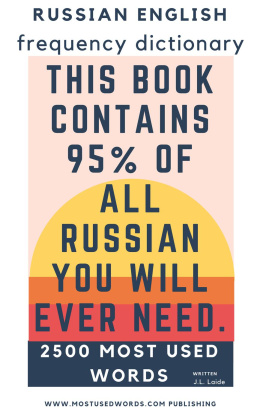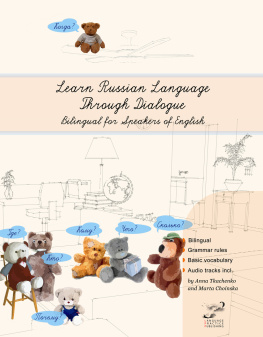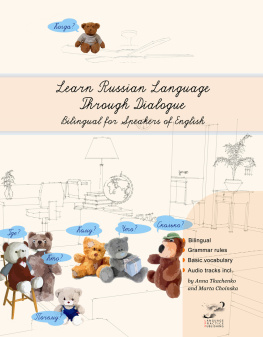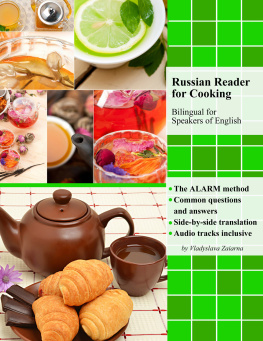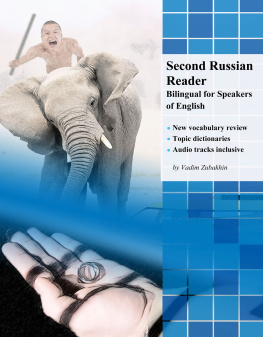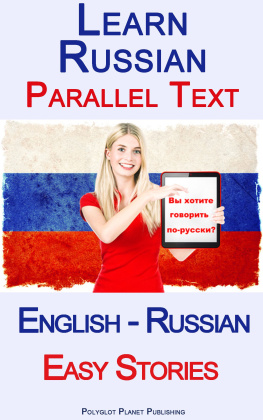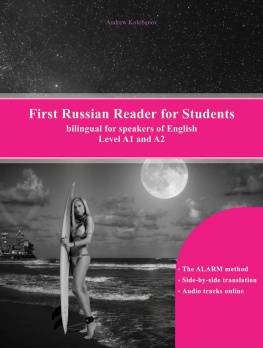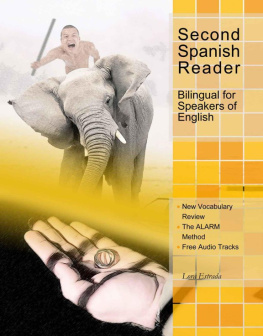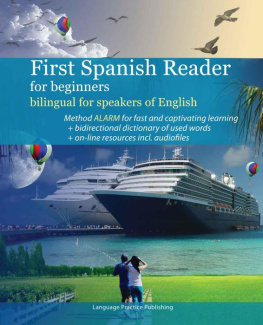Vadim Zubakhin First Russian Reader for Beginners Bilingual for Speakers of English Audio tracks inclusive on ]
We recommend installing VLC for Android from Google Play to listen to audio tracks while reading the book. After installing VLC, go to the internet address detailed below and click an audio track. When prompted choose "Open with VLC". If you experience difficulties opening audio tracks with VLC, change default app for music player. Go to Settings -> Apps, choose VLC and click "Open by default" or "Set default". If some characters do not show up properly, set your e-book reader to the Linux font or similar.
Audio tracks www.lppbooks.com/Russian/FirstRussianReader_audio/En/ Homepage www.audiolego.com Eighth edition Editor Natasha Kolobanova Design: Audiolego Design Copyright 2011 2012 2013 2015 2016 2017 Language Practice Publishing Copyright 2016 Audiolego This book is in copyright. Subject to statutory exception and to the provisions of relevant collective licensing agreements, no reproduction of any part may take place without the written permission of Language Practice Publishing. Table of Contents Russian alphabet Capital Small Name IPA English example ...... [a] ... /a/ ... [b] ... /b/ or /b/ ... b in hit ...... [v] ... /v/ or /v/ ... v in veal ...... [] ... // ... g in get , or h in hat ...... [d] ... /d/ or /d/ ... d in do ...... [je] ... /je/ or / e/ ... ye in yet ...... [jo] ... /jo/ or / o/ ... yo in york ...... [] ... // ... g in genre, s in pleasure ...... [z] ... /z/ or /z/ ... z in zoo ...... [i] ... /i/ or / i/ ... e in me ......... /j/ ... y in yes ...... [ka] ... /k/ or /k/ ... k in kitchen ...... [el] ... /l/ or /l/ ... l in lock ...... [m] ... /m/ or /m/ ... m in mat ...... [n] ... /n/ or /n/ ... n in not ...... o [o] ... /o/ ... o in more ...... [p] ... /p/ or /p/ ... p in put ...... [r] ... /r/ or /r/ ... rolled r ...... [s] ... /s/ or /s/ ... s in sea ...... [t] ... /t/ or /t/ ... t in top ...... [u] ... /u/ ... oo in foot ...... [f] ... /f/ or /f/ ... f in fate ...... [xa] ... /x/ ... like h in harp ...... [ts] ... /ts/ ... ts in meets ...... [te] ... /t/ ... ch in chess ...... [a] ... // ... similar to the sh in shop ...... [a] ... // ... similar to the sh in shake ......... puts a distinct /j/ sound in front of the following iotified vowels ...... [] ... [] ... like i in Billy ......... / / ... slightly palatalises the preceding consonant ...... [] ... /e/ ... e in met ...... [ju] ... /ju/ or / u/ ... u in use ...... [ja] ... /ja/ or / a/ ... ya in yard



Dillard has a dog
Words - pen - pens - Andrew (name) - notebook - notebooks - big - bike 8. - eye - eyes - hotel - hotels - Donetsk (city) - his - his bed - star 16. - green 17. ; - and - has; . - He has a book. - to have - book - room - rooms - cat - nice - beds - bed - shop - shops - little - Dillard (name) - dream - many, much (m), (f), (n), (pl) - my 34. - not - new 36. - nose - one - windows - window 40. - he - they 42. - park - parks - Pasha (name) - blue - words - word - dog 49. - table - tables - student - students 53. - those 54. - text , - too 56. - that 57. - I have, - we have, / - you have, - he/it has, - she has, - they have - street - streets 60. - black - four - these (m), (f), (n) - this; - this book 64. - I
( click to see the translation ) 1. . 2. . ( ) 3. . 4. . ( ) 5. . 6. . 7. . 8. . 9. . 10. . 11. . 12. . 13. . 14. . ( ) 15. . 16. . 17. . 18. . 19. . 20. . 21. . 22. . ( ) 23. . 24. . 25. . 27. . 28. . 29. . 30. .
Dillard has a dog 1.This student has a book. 2.He has a pen too. 2.He has a pen too.
Donetsk has many streets and parks. 4.This street has new hotels and shops. 5.This hotel has four stars. 6.This hotel has many nice big rooms. 7.That room has many windows. 9.These rooms have four beds. 10.And those rooms have one bed. 11.That room does not have many tables. 12.And those rooms have many big tables. 13.This street does not have hotels. 14.That big shop does not have many windows. 15.These students have notebooks. 16.They have pens too. 17.Dillard has one little black notebook. 18.Andrew has four new green notebooks. 19.This student has a bike. 20.He has a new blue bike. 21.Pasha has a bike too. 22.He has a nice black bike. 23.Andrew has a dream. 24.I have a dream too. 25.I do not have a dog. 26.I have a cat. 27.My cat has nice green eyes. 28.Dillard does not have a cat. 29.He has a dog. 30.His dog has a little black nose.

Pronunciation For the most part one Russian letter corresponds to one sound. is always stressed. is pronounced if unstressed: - [ ] milk . is pronounced if unstressed: - [ ] manager . is pronounced if unstressed: - [ ] manager .
Ending - is always pronounced -: - [ ] his, him. When consonants appear at the end of a word, they lose their voice. is pronounced like : - [] club is pronounced like : - [ ] Medvedev (a surname) is pronounced like : - [ ] marketing is pronounced like : - [ ] chocolate is pronounced like : - [] lie is pronounced like : - [ ] caprice Gender of Nouns There are no articles used with nouns. There are three genders: masculine, feminine and neuter. Both animate and inanimate nouns have a gender which depends on a word ending. Masculine nouns normally end with a consonant or -: (city) , (number) , (DJ).
Common exceptions: (dad) , (uncle) , (man). Feminine nouns normally end with a or : (surname) , (firm) Neuter nouns end with or : (middle name) , (building). Common exception: (name) Most nouns ending with can be masculine or feminine: (fem. network) , (masc. day) , (masc.

They live in Donetsk
Words , - American - big 3. - brother 4. - in - hungry - city 7. - two 8. - to live 9. , , - from - Liuba (name) 11. - mother 12. - we 13. - in, on, at - is, situated - she - to buy - Russia , (m); , (f); , (adj) - Russian - now - sister - supermarket 22. - the USA - sandwich 24. , , - you - Ukraine (m), (f), (adj) - Ukrainian

